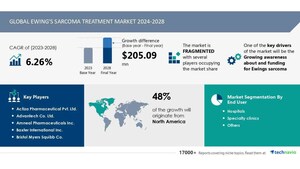NEW YORK, Nov. 22, 2024 /PRNewswire/ -- Report on how AI is redefining market landscape - The global baby diapers market size is estimated to grow by USD 22.5 billion from 2024-2028, according to Technavio. The market is estimated to grow at a CAGR of almost 7.03% during the forecast period. Consumers shift toward natural and organic products is driving market growth, with a trend towards rising r and d investments by key market competitors. However, rising awareness of negative impacts associated with baby diapers poses a challenge.Key market players include Cotton Babies Inc., Domtar Corp., Drylock Technologies NV, Essity AB, First Quality Enterprises Inc., Hayat Kimya San AS, Hengan International Group Co. Ltd., Kao Corp., Kimberly Clark Corp., Koninklijke Philips N.V., Moo Moo Kow, Nobel Hygiene Pvt. Ltd., Ontex BV, Parents Favorite and Eastrock LLC, Pigeon Corp., The Hain Celestial Group Inc., The Honest Co. Inc., The Natural Baby Co., The Procter and Gamble Co., and Unicharm Corp..
AI-Powered Market Evolution Insights. Our comprehensive market report ready with the latest trends, growth opportunities, and strategic analysis- View Free Sample Report PDF
Forecast period |
2024-2028 |
Base Year |
2023 |
Historic Data |
2018 - 2022 |
Segment Covered |
Product (Disposable, Training, Swim pants, and Others), Distribution Channel (Offline and Online), and Geography (APAC, North America, Europe, Middle East and Africa, and South America) |
Region Covered |
APAC, North America, Europe, Middle East and Africa, and South America |
Key companies profiled |
Cotton Babies Inc., Domtar Corp., Drylock Technologies NV, Essity AB, First Quality Enterprises Inc., Hayat Kimya San AS, Hengan International Group Co. Ltd., Kao Corp., Kimberly Clark Corp., Koninklijke Philips N.V., Moo Moo Kow, Nobel Hygiene Pvt. Ltd., Ontex BV, Parents Favorite and Eastrock LLC, Pigeon Corp., The Hain Celestial Group Inc., The Honest Co. Inc., The Natural Baby Co., The Procter and Gamble Co., and Unicharm Corp. |
Key Market Trends Fueling Growth
The baby diaper market is experiencing significant trends with a focus on eco-friendliness and consumer convenience. Baby wipes and biodegradable diapers made from biodegradable materials and bio-ingredients are gaining popularity. Comfortable fit and compostable diaper designs are essential for parents, especially during the developmental phase of extended duration babies. Consumer buying behavior is influenced by convenience, health awareness campaigns, and increased spending on infant hygiene. Conventional disposable diapers are being replaced with cloth-based diaper alternatives and pant-style diapers. The rise of the urban population and female working population have led to the growth of retail infrastructure, including pharmacies/drug stores and specialty stores. Technological advancements have resulted in diapers with easy changing processes, underwear-like designs, and versatile fits. Sustainability and recyclability are key considerations, with organic and recycled materials becoming increasingly common. Skin-to-skin contact remains important, and online purchases are convenient for working parents. The huge populations of exclusive breastfeeding infants and literate consumers with internet access further fuel market growth.
The baby diapers market is experiencing significant advancements, with key competitors increasing their Research and Development (R&D) investments. These investments aim to enhance the efficiency and safety of baby care products. Innovations in the market include diapers catering to various skin types and ages. Additionally, there has been a focus on manufacturing diapers without fluff pulp, an alternative to Dry Max technology from Pampers. Competitors are employing reverse engineering techniques to create these diapers. These developments underscore the industry's commitment to providing superior baby care solutions.
Insights on how AI is driving innovation, efficiency, and market growth- Request Sample!
- The baby diaper market is experiencing significant growth due to rising population and increased consumer spending. Convenience and consumer buying behavior are key drivers, with disposable diapers being the preferred choice for many parents. However, challenges such as diaper rashes and environmental impact are prompting innovation. Developments in biodegradable diapers using biodegradable materials and bio-ingredients are gaining traction. Comfortable fit and easy changing process are essential considerations. Consumer awareness campaigns on health and eco-friendliness are influencing buying behavior. Technological advancements include compostable diaper designs, pant-style diapers, and underwear-like designs. Cloth-based diaper alternatives and reusable diapers offer sustainability benefits. Urbanization and the female working population's needs have led to retail infrastructure, including pharmacies/drug stores, specialty stores, and online purchases. The market faces challenges like consistent diaper usage, recyclability, and the developmental phase of extended duration babies. Skin-to-skin contact remains important for infant hygiene. Eco-friendliness, sustainability, and technological advancements are crucial factors shaping the market.
- Disposable baby diapers, including eco-friendly options, contain concerning chemicals that pose potential health risks. Dioxin, a toxic by-product of paper bleaching, is found in diapers and is classified as the most hazardous cancer-causing agent. It's linked to congenital disabilities, skin diseases, liver diseases, immune system suppression, and genetic damage in lab animals. Additionally, sodium polyacrylate, a super-absorbent chemical, is added to diapers' inner layers. Phthalates, endocrine disruptors found in some diapers' plastics, mimic human hormones and cause overstimulation. These chemicals raise concerns for babies' health and development.
Insights into how AI is reshaping industries and driving growth- Download a Sample Report
This baby diapers market report extensively covers market segmentation by
- Product
- 1.1 Disposable
- 1.2 Training
- 1.3 Swim pants
- 1.4 Others
- Distribution Channel
- 2.1 Offline
- 2.2 Online
- Geography
- 3.1 APAC
- 3.2 North America
- 3.3 Europe
- 3.4 Middle East and Africa
- 3.5 South America
1.1 Disposable- Disposable baby diapers represent a significant market segment in the baby hygiene products industry. Their convenience and hygienic benefits attract numerous customers, particularly in the context of increasing numbers of dual-income households and heightened awareness of proper baby hygiene. Various diaper variants, including super absorbent and ultra-absorbent options, cater to diverse consumer needs. The demand for eco-friendly and ultra-absorbent diapers is escalating due to health and environmental concerns. However, many disposable diapers contain potentially harmful substances like polyethylene, petroleum, wood pulp, perfume, and non-renewable petroleum-based ingredients. These chemicals can negatively impact babies and contribute to dioxin emissions, posing risks to developing infants and the environment. Consequently, the market growth will be driven by the increasing demand for eco-friendly, ultra-absorbent baby diapers.
Download complimentary Sample Report to gain insights into AI's impact on market dynamics, emerging trends, and future opportunities- including forecast (2024-2028) and historic data (2018 - 2022)
The Baby Diapers Market is witnessing significant growth due to the rising population and urbanization, particularly among working parents who prioritize convenience and infant hygiene. Technological advancements have led to the emergence of eco-friendly and sustainable diaper options, such as biodegradable and bio-ingredients-based baby diapers. These diapers are made from biodegradable materials, reducing their environmental impact and promoting sustainability. The use of compostable diaper designs and recyclable components further enhances their eco-friendliness. Health awareness campaigns and increasing literacy rates have led parents to prioritize their babies' health, resulting in a growing demand for diapers that minimize diaper rashes. Baby wipes have also gained popularity as an essential companion to diapers. Despite these benefits, concerns regarding the disposal and recyclability of diapers remain, highlighting the need for continued innovation in the industry. Overall, the Baby Diapers Market is poised for continued growth as it caters to the evolving needs and priorities of modern parents.
The Baby Diapers Market is experiencing significant growth due to the rising population and increased consumer spending on infant hygiene. Convenience and consumer buying behavior are key drivers, with disposable diapers being the preferred choice for many parents due to their ease of use and consistent diaper usage. However, there is a growing trend towards eco-friendliness and sustainability, leading to the development of biodegradable diapers made from biodegradable materials and bio-ingredients-based baby diapers. Comfort is also a major consideration, with diapers featuring a comfortable fit, underwear-like design, and skin-to-skin contact. Technological advancements have led to the creation of compostable diaper designs, cloth-based diaper alternatives, and recyclable diapers. Health awareness campaigns and the exclusive breastfeeding period have also influenced consumer behavior, with many parents opting for organic and natural diaper options. The market is also being driven by the urban population, female working population, and retail infrastructure, including pharmacies/drug stores, specialty stores, and online purchases. Diaper rashes remain a concern, and manufacturers are focusing on developing diapers that provide a versatile fit and easy changing process to minimize their occurrence. Urbanization and literacy rate are also contributing factors, with parents in developing countries increasingly recognizing the importance of infant hygiene. The market is expected to continue growing in the coming years, with a focus on sustainability, affordability, and convenience.
1 Executive Summary
2 Market Landscape
3 Market Sizing
4 Historic Market Size
5 Five Forces Analysis
6 Market Segmentation
- Product
- Disposable
- Training
- Swim Pants
- Others
- Distribution Channel
- Offline
- Online
- Geography
- APAC
- North America
- Europe
- Middle East And Africa
- South America
7 Customer Landscape
8 Geographic Landscape
9 Drivers, Challenges, and Trends
10 Company Landscape
11 Company Analysis
12 Appendix
Technavio is a leading global technology research and advisory company. Their research and analysis focuses on emerging market trends and provides actionable insights to help businesses identify market opportunities and develop effective strategies to optimize their market positions.
With over 500 specialized analysts, Technavio's report library consists of more than 17,000 reports and counting, covering 800 technologies, spanning across 50 countries. Their client base consists of enterprises of all sizes, including more than 100 Fortune 500 companies. This growing client base relies on Technavio's comprehensive coverage, extensive research, and actionable market insights to identify opportunities in existing and potential markets and assess their competitive positions within changing market scenarios.
Technavio Research
Jesse Maida
Media & Marketing Executive
US: +1 844 364 1100
UK: +44 203 893 3200
Email: [email protected]
Website: www.technavio.com/
SOURCE Technavio

WANT YOUR COMPANY'S NEWS FEATURED ON PRNEWSWIRE.COM?
Newsrooms &
Influencers
Digital Media
Outlets
Journalists
Opted In






Share this article